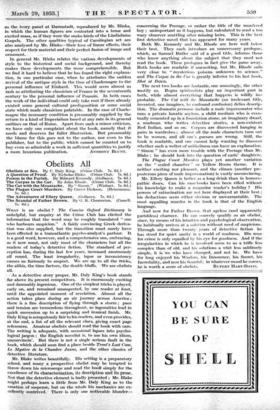Obelists All
7s. 6d.)
The Adventures of Ellery Queen. (Gollancz. 7s. 6d.)
WHAT is an obelist ? The Concise Oxford Dictionary is unhelpful, but enquiry -at the Crime Club has elicited the information that the word may be roughly translated " one who harbours suspicion." A fairly convincing Greek deriva- tion was also supplied, but the transition must surely have been effected in a transatlantic psycho-analyst's parlour. It is a good word, however, and a comprehensive one, embracing, as it now must, not only most of the characters but all the readers of today's detective fiction. The standard of per- ception has, during the last few years, increased enormously all round. The least irregularity, lapse or inconsistency causes us furiously to suspect. We are up to all the tricks, ,the alibis, the time factors, the double-bluffs. --We are obelists
- As a.cletective story proper, Mr. Daly King's book stands dar -above its present competitors. It is enormously exciting and damnably ingenious. One of the simplest tricks is played, early on, and remained unsuspected, by one reader at least, -until the appointed moment of revelation. Almost all the action takes place during an air journey across America ; there is a fine description of flying through a storm ; pace and tension are tremendous throughout, as ingenuities lead in quick succession up to a surprising and ironical finish. Mr. Daly King is scrupulously fair to his readers, and even provides, at• the end, a list of all the relevant clues, giving exact page references. Amateur obelists should read the book with care.
The writing is adequate, with occasional lapses into psycho- logical jargon ; the English novelist is, to use his own idiom,
unconvincin'. But there is not- a single serious fault in the hook, which should soon find a place beside Trent's Last Case, Le Mystere de /a Chambre Jaune, and the other classics of detective literature.
Mr. Blake writes beautifully. His setting is a preparatory school, and many a prospective obelist may be tempted to throw down his microscope and read the book simply for the excellence of its characterization, its description and its prose. Not that the detective element is badly presented ; Mr. Blake might perhaps learn a little- from Mr. Daly King as to the creation of suspense, but on the whole his mechanics are ex- cellently contrived. There is only One noticeable blunder—
concerning the Peerage, or rather the title of the murdered boy ; unimportant as it happens, but calculated to send a too wary observer scuttling after missing heirs. This is the best first detective novel that has appeared for many years.
Both Mr. Kennedy and Mr. Rhode are here well below their best They each introduce an unnecessary prologue, which, as Samuel Butler said of a good title, informs those who know anything about the subject that they need not read the book. These prologues in fact give the game away. Both books are readable if unexciting, but Mr. Rhode sails very close to " mysterious poisons unknown to science," and The Corpse in the Car is greatly inferior to his last book, Shot at Dqwn.
The next two books are fantastic, one amusingly, the other nastily so. Bogus spiritualists play an important part in both, while almost everything that happens is wildly im- probable. The Cat with the Moustache (an irrelevant title, invented, one imagines, to confound confusion) defies descrip- tion. The dramatis personae include a male impersonator who runs a private lunatic asylum, a child medium who is even- tually cemented up in a foundation stone, an imaginary dwarf, a madman who writes detective stories, a non-existent Red Indian, and so on. Corpses are discovered hanging in pairs in wardrobes; almost all the male characters turn out to be women, and all one's guesses are wrong. Still, the book is readable, and one cannot help wanting to discover .whether such a welter of unlikeliness can have an explanation. " Simon " has even more trouble with the Peerage than Mr. Blake ; he should look into the question of earls' daughters.
The Plague Court Murders plays yet another variation on the " sealed climber " or Yellow Room theme. It is neither exciting nor pleasant, and the climax (another pre- posterous piece of male impersonation) is vastly unconvincing.
Mr. Ellery Queen is better as a long drink than in homoeo- pathic doses. Can his case-books have been rifled without his knowledge to make a magazine reader's holiday ? His powers of ratiocination are not here displayed at their best ; his deductions seem either obvious or unwarrantable. The most appalling murder in the book is that of the English , language.
And now for Father Brown, that ageless (and apparently parishless) charmer. He can scarcely qualify as an obelist, since, by means of his intuition and psychological observation, he habitually arrives at a solution without need of suspicions. Through more than twenty years of detective fiction he has stood for quiet sanity in a world of madness. His nose for crime is only equalled by his eye for goodness. And if the irregularities in which he is involved seem to us a trifle less complex than of old, and his solutions a whit less sublimely simple, it is we who have changed,. and not he. We have for long enjoyed his Wisdom, his Innocence, his Secret, his Incredulity, and now his Scandal ; in whatever mood he comes,
he is worth a score of obelists. RUPERT HART-DAVIS.






































 Previous page
Previous page